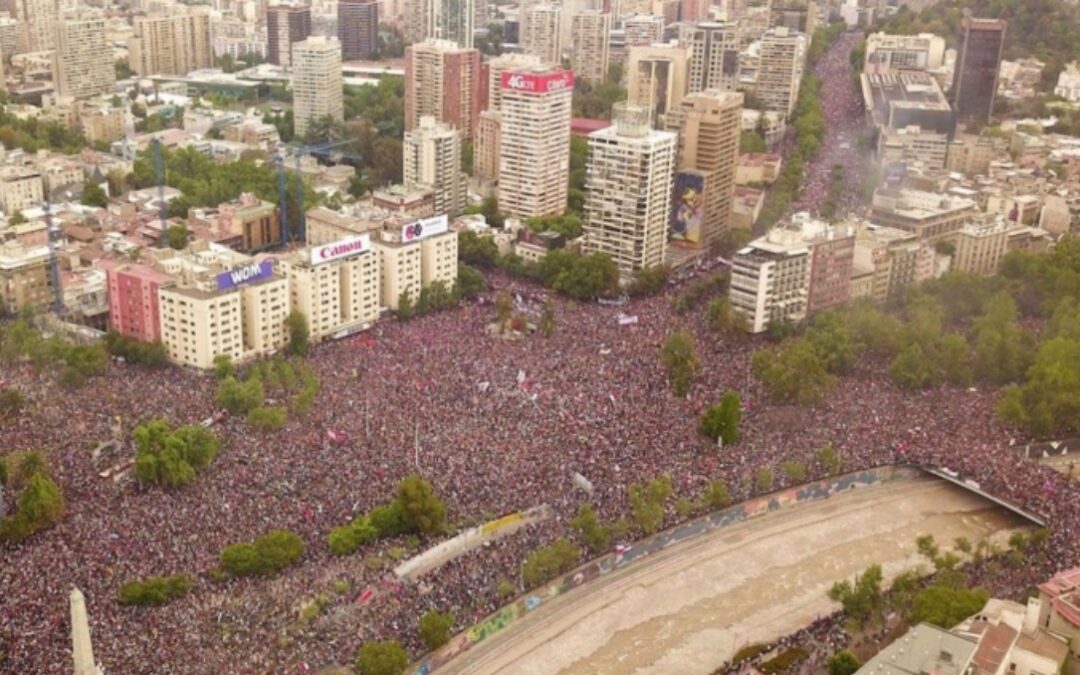
Oct 31, 2019 | Editorial, Noticias
Una opinión editorial de Alejandro Salinas Rivera, Comisionado chileno de la CIJ
La desigualdad social, la desconfianza en las instituciones públicas y la falta de goce efectivo de los derechos económicos y sociales, son las raíces de las recientes protestas en Chile.
Los orígenes de las protestas reflejan tres problemas estructurales del modelo político y social del Estado chileno: la desigualdad social a pesar del éxito económico del país, la desconfianza en las instituciones públicas, y la insuficiente capacidad del Estado para garantizar los derechos económicos y sociales.
Además, el país enfrenta frustraciones que quedaron desde la época de la dictadura, y problemas que se han evidenciado durante la época democrática.
En efecto, los derechos no están garantizados de manera uniforme para toda la población chilena. Por ejemplo, algunas personas acceden a servicios de salud que son similares a aquéllos proporcionados en países desarrollados, mientras que otras acceden a servicios de muy baja calidad.
También, la educación se garantiza de manera desigual: la educación pública es costosa y las tasas universitarias son muy altas para la mayoría de la población.
Además, las municipalidades están clasificados entre ricas y pobres, y la infraestructura y la calidad de las carreteras cambian según el barrio. ¿Es todo esto justo? No. Entonces, ¿por qué hay tantas desigualdades entre la población chilena?
Este contexto ha generado que la ciudadanía no confíe en que las instituciones públicas garantizarán sus derechos, y la desesperanza ha impregnado a muchas personas.
Protestas sociales actuales: ¿qué se puede hacer?
Desde hace unas semanas Chile vive un estallido de protesta social. El hecho desencadenante fue el anuncio del 6 de octubre por parte del gobierno chileno de aumentar los precios del metro de Santiago; pero, las protestas están relacionadas con la desigualdad social y la desconfianza en las instituciones públicas.
Después de ese anuncio gubernamental, algunas personas, principalmente estudiantes, evadieron continuamente el pago de las tarifas del metro, y las fuerzas policiales (Carabineros) fueron enviadas para detener dicha evasión.
Así, las acciones de evasión escalaron, y en la noche del 18 de octubre, surgieron masivamente protestas sociales en diferentes ciudades del país que, aún hoy, no han cesado.
La respuesta inicial del presidente Sebastián Piñera fue decretar un estado de emergencia, un toque de queda y desplegar a las fuerzas militares a algunas calles.
Frente a esto, los manifestantes aumentaron y las protestas continuaron y se expandieron a distintas regiones del país.
Se han presentado serias denuncias sobre el uso excesivo de la fuerza por parte de las fuerzas policiales, así como, posibles detenciones arbitrarias ocurridas durante las manifestaciones. Esto requiere que el Estado chileno, en cumplimiento de estándares internacionales, realice una investigación adecuada y efectiva y si la evidencia lo amerita, enjuicie a los responsables.
Por otro lado, si bien la mayoría de protestas han sido pacíficas, algunos manifestantes han cometido actos violentos. Esto no deslegitima la protesta social, pero es necesario que se rechace esta violencia.
Ahora bien, después de más de 13 días de protestas sociales, el gobierno no ha podido generar las condiciones requeridas para concretar un pacto político y social que incluya otras fuerzas políticas, y le permita solucionar de manera adecuada la crisis. Las fuerzas de oposición política, además, tampoco han sido suficientemente generosas en este caso.
Asimismo, la sociedad civil debe brindar alternativas para abordar esta crisis.
En suma, debe haber una solución política que enfrente las raíces de las protestas. Los políticos deben reconocer el descontento social y enfrentarlo a pesar de sus diferencias. Deben converger en un acuerdo social y político que responda, con urgencia, a las demandas sociales en materia de equidad, justicia y solidaridad, así como, a la necesidad de aumentar la confianza en las instituciones públicas.
Por último, los políticos y las instituciones públicas deben garantizar los derechos económicos y sociales de la población, para lo cual, es necesario adoptar las reformas legales requeridas y promulgar políticas públicas que permitan superar la desigualdad social.
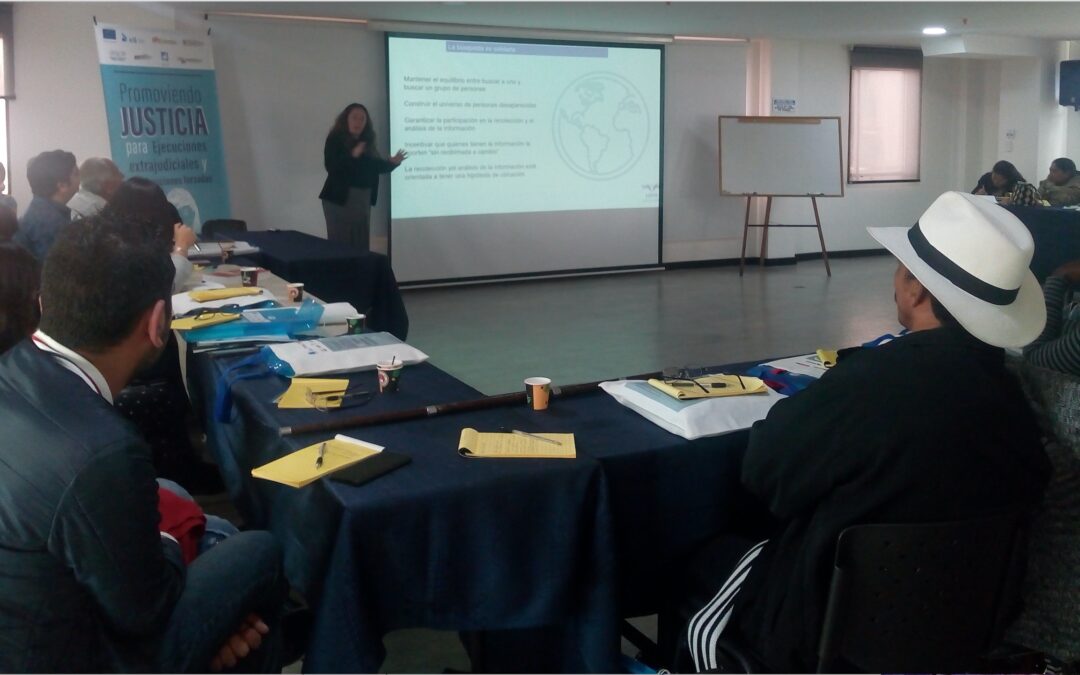
Oct 31, 2019 | Artículos, Noticias
Los días 29 y 30 de octubre, la CIJ, en asocio con dhColombia y el Equipo Argentino de Antropología Forense (EAAF), organizó una capacitación sobre el marco legal sobre la desaparición forzada y las ejecuciones extrajudiciales en Bogotá (Colombia).
La capacitación tuvo como objetivo mejorar la comprensión de víctimas y abogados de derechos humanos sobre la legislación nacional sobre ejecuciones extrajudiciales y desapariciones forzadas en Colombia. La capacitación incluyó un análisis del sistema de justicia ordinario y de los mecanismos de justicia transicional. También exploró el papel de las ciencias forenses en la lucha contra la impunidad de esos crímenes.
La CIJ, en cumplimiento de su objetivo de promover la rendición de cuentas, la justicia y el estado de derecho en Colombia, ha estado monitoreando continuamente la investigación y el enjuiciamiento de violaciones y abusos graves de los derechos humanos, en particular las ejecuciones extrajudiciales y las desapariciones forzadas. Los autores de tales violaciones, que constituyen crímenes de derecho internacional, han disfrutado de un alto nivel de impunidad. Hay numerosos casos sin resolver que datan de la década de 1970 y las violaciones han continuado incluso después de la firma del Acuerdo Final de Paz en 2016.
En Colombia, lograr la rendición de cuentas por esos crímenes ha resultado difícil por varias razones, incluido el funcionamiento ineficaz del sistema de justicia. Las víctimas y sus abogados han enfrentado serios obstáculos para acceder a recursos efectivos. Además, la creación de nuevas instituciones por el Acuerdo Final de Paz ha cambiado algunas reglas y procedimientos básicos para la investigación y el enjuiciamiento de esos crímenes. En consecuencia, el sistema de justicia colombiano es más complicado de entender, no solo para las víctimas sino también para los abogados.
El taller de capacitación fue parte de un proyecto regional más amplio que aborda la justicia por ejecuciones extrajudiciales y desapariciones forzadas en Colombia, Guatemala y Perú. Los participantes fueron víctimas y abogados de derechos humanos de diferentes regiones del país, especialmente aquellos lugares donde hay menos oportunidades de acceder a capacitación legal y forense. Teniendo en cuenta que las actividades de creación de capacidad son esenciales para el logro efectivo de la rendición de cuentas, se espera que los participantes de la capacitación hayan obtenido herramientas valiosas para exigir justicia y reparación por violaciones graves de los derechos humanos.
Contactos:
Rocío Quintero M, Asesora Legal, América Latina. Correo electrónico: rocio.quintero(a)icj.org
Carolina Villadiego, Asesora Legal, América Latina y coordinadora regional del proyecto. Correo Electrónico: carolina.villadiego(a)icj.org
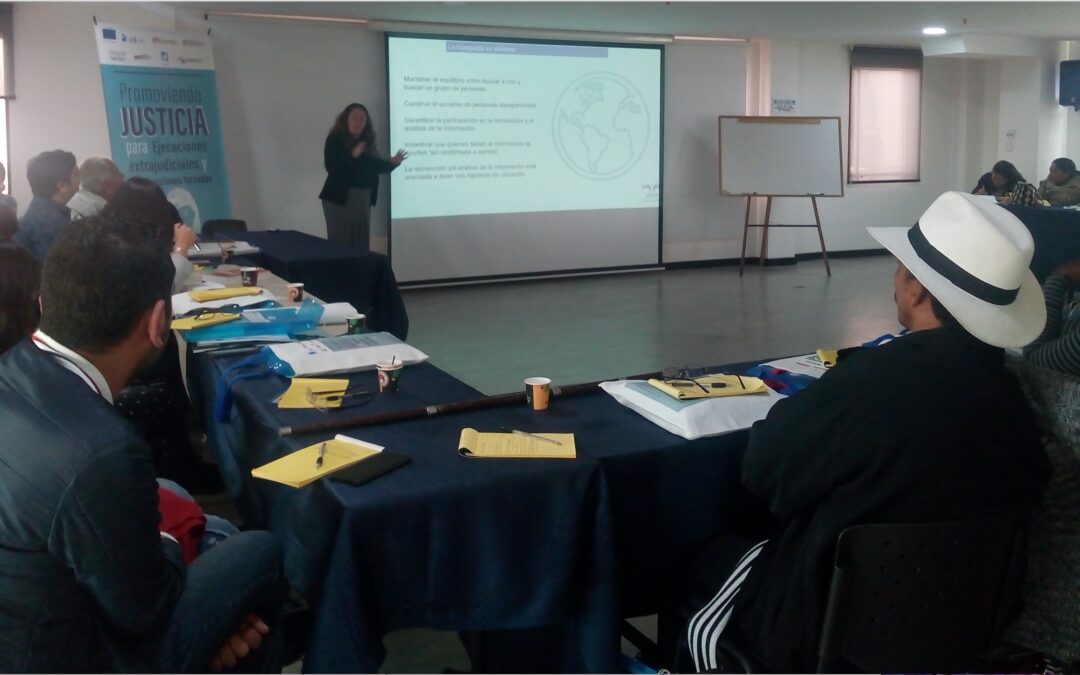
Oct 31, 2019 | News
On 29-30 October the ICJ, in partnership with dhColombia and the Argentine Forensic Anthropology Team (EAAF), hosted a two-day training workshop in Bogotá on the legal framework around enforced disappearance and extrajudicial killings.
The training aimed to improve the understanding of victims and human rights lawyers of the domestic law on extrajudicial killings and enforced disappearances in Colombia. It included an analysis of both the ordinary justice system, as well as transitional justice mechanisms. It also explored the role of the forensic sciences in tackling impunity for those crimes.
The ICJ in furtherance of its objective to promote accountability, justice and the rule of law in Colombia, has been continuously monitoring the investigation and prosecution of serious human rights violations and abuses, particularly extrajudicial killings and enforced disappearances. Perpetrators of such violations, which constitute crimes under international law, have enjoyed a high level of impunity. While there are numerous unresolved cases dating back to the 1970s, violations have continued even after a comprehensive peace agreement was signed in 2016 following decades of armed conflict.
In Colombia, achieving accountability for those crimes has proven difficult for several reasons, including the ineffective functioning of the justice system. Victims and their lawyers have faced serious obstacles in gaining access to effective remedies. In addition, the creation of new institutions by the Peace Agreement has changed some basic rules and procedures for the investigation and prosecution of those crimes. Consequently, the Colombian justice system is more complicated to understand not only for victims but for lawyers.
The training workshop was part of a broader regional project addressing justice for extrajudicial killings and enforced disappearances in Colombia, Guatemala and Peru. Participants were victims and human rights lawyers from different regions of the country, especially those where that is less opportunity to access legal and forensic training. Considering that capacity building activities are essential to the effective achievement of accountability, it is expected that participants of the training will obtain valuable tools to demand justice and remedy and reparations for serious human rights violations.
Contacts:
Rocío Quintero M, Legal Adviser, Latin America. Email: rocio.quintero(a)icj.org
Carolina Villadiego, ICJ Legal and Policy Adviser, Latin America, and Regional Coordinator of the Project. Email: carolina.villadiego(a)icj.org
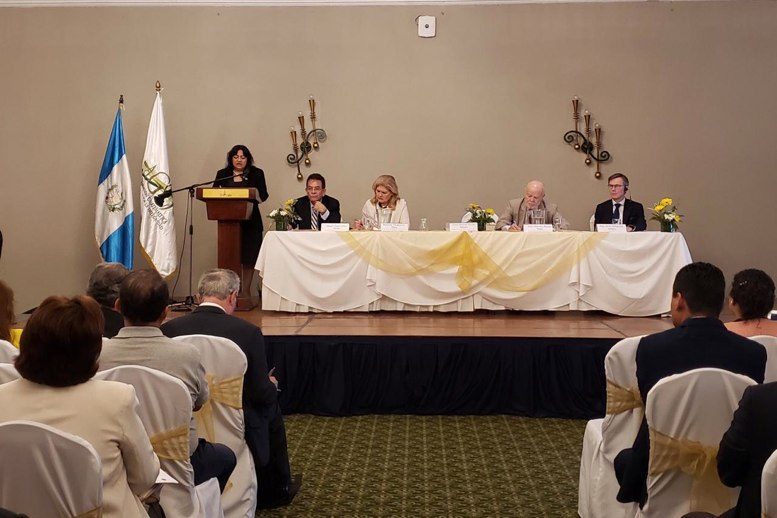
Oct 22, 2019 | Artículos, Noticias
La CIJ anuncia visita de delegación internacional de alto nivel para participar en la VII Conferencia Regional sobre Independencia Judicial el 25 y 26 de Octubre.
La CIJ en Centroamérica llevará a cabo la VII Conferencia Regional sobre Independencia Judicial, con el tema central de la Seguridad de Jueces y Juezas.
En ella se debatirá sobre el papel que deben de jugar los estados, para la protección de jueces y juezas, así como la relación que existe entre la independencia judicial y la seguridad de quienes imparten justicia.
Han llegado al país, la magistrada de la Corte Suprema de Justicia de Serbia y Comisionada de la CIJ, Radmila Dragicevic, el Magistrado Emérito del Tribunal Supremo Español y Comisionado de la CIJ José Antonio Martín Pallín, dos Jueces de Noruega Erland Flaterud y Finn-Arne Schanche y 9 Jueces de Centroamérica, entre los cuáles se encuentra el Magistrado de la Corte Suprema de Justicia de El Salvador Leonardo Ramírez Murcia. Además, participará el Presidente de la Corte Suprema de Justicia de Costa Rica, Fernando Cruz Castro.
Guatemala-Judicial Conference CA-News-2019-SPA
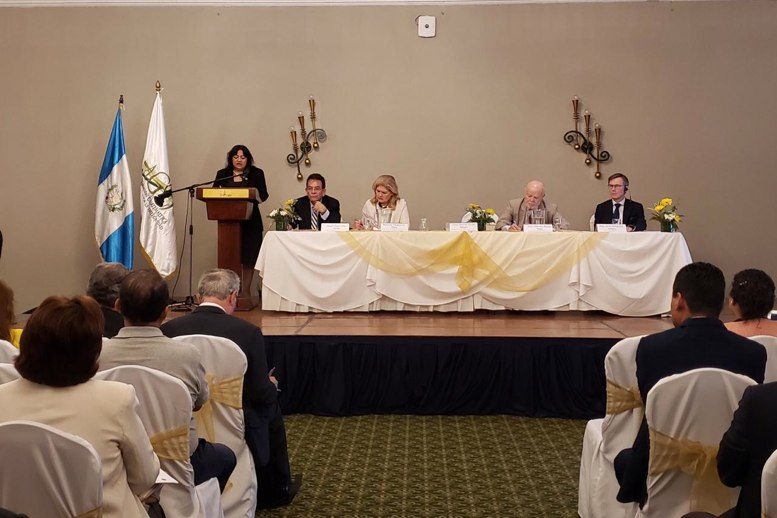
Oct 22, 2019 | News
On 25 and 26 October, the ICJ in Central America will hold the VII Regional Conference on Judicial Independence, with the central theme of the protection and security of Judges.
The Conference will discuss the role that governments should play in the protection of judges, as well as the relationship between judicial independence and security of those who deliver justice.
Participants from outside the region include Radmila Dragicevic Justice of the Supreme Court of Cassation of Serbia and Vice-President of the ICJ; José Antonio Martín Pallín, Judge Emeritus of the Spanish Supreme Court of Justice and ICJ Commissioner, and Erland Flaterud and Finn Arne Schanche, both judges from Norway.
Nine other judges from Central America will attend, including Leonardo Ramírez of the Supreme Court of Justice of El Salvador Murcia and Fernando Cruz Castro, President of the Supreme Court of Justice of Costa Rica.
The ICJ regrets that the Supreme Court of Justice of Guatemala has not been in a position to receive this important delegation at its plenary on 23 October to address the issue of the security of judges.
The ICJ recalls that this Conference is held within the framework of a letter of cooperation and understanding agreed with the former President of the Judicial Branch and the Supreme Court of Justice, Ranulfo Rojas Cetina in 2015.
The ICJ is particularly concerned that there is presently an unfilled vacancy for Chief of Security for the judiciary, following the resignation of the former Chief who had allegedly engaged in conduct not consistent with his function.
Ramón Cadena, Director of the ICJ for Central America, said: “It is the duty of the Supreme Court of Justice to inform the Guatemalan public about the Judges Protection System, so that it does not become a source of corruption or in any way interferes with the work of independent, and impartial judges.”
In Guatemala, the international delegation will meet with judges such as Yassmín Barrios, Ericka Aifán, Miguel Ángel Gálvez, Carlos Ruano and Pablo Xitumul among others. They have been the subject of seemingly unfounded complaints which have posed risks to their personal security and independent judicial functioning.









